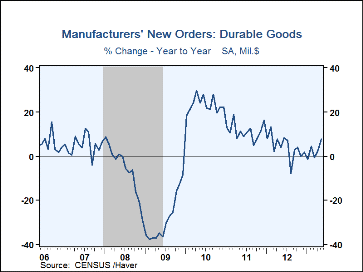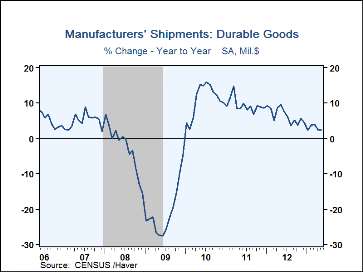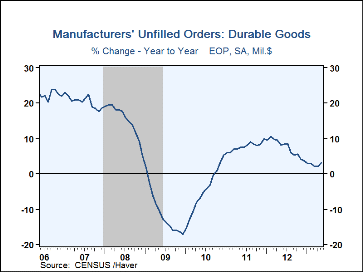 Global| Jun 25 2013
Global| Jun 25 2013U.S. Durable Goods Orders Strength Is Broad-based
by:Tom Moeller
|in:Economy in Brief
Summary
Improvement in new orders is broadening within the factory sector. New orders for durable goods jumped 3.6% (7.6% y/y) during May following a like increase in April, initially reported as 3.3%. A 2.5% rise in orders for last month had [...]
Improvement in new orders is broadening within the factory sector. New orders for durable goods jumped 3.6% (7.6% y/y) during May following a like increase in April, initially reported as 3.3%. A 2.5% rise in orders for last month had been expected. As in April, higher orders in the transportation sector led the increase with a 10.2% gain (19.2% y/y). It reflected a 39.2% jump (60.5% y/y) in aircraft & parts bookings. Nondefense aircraft orders increased by one-half (85.9% y/y) while defense aircraft orders gained 3.7% (0.5% y/y. Orders for motor vehicles and parts fell 1.2% (+7.3% y/y).
Orders excluding the transportation sector rose 0.7% (2.8% y/y), which followed a 1.7% April jump. The broad-based gain reflected a 2.7% increase (-5.2% y/y) in orders for computers & electronic products. Communications equipment orders jumped 12.6% (19.0% y/y) and computers & related products gained 1.0% (-15.1% y/y). Orders for electrical equipment strengthened by 1.4% (-2.3% y/y) while machinery orders rose 1.2% (6.5% y/y). Primary metal orders gained 0.9% (6.0% y/y) but orders for fabricated metals were off 0.9% (+2.7% y/y). Nondefense capital goods orders surged for a second month. The 9.3% gain (15.9% y/y) added to its 3.5% April rise. Orders excluding aircraft & parts, a measure of "core" business investment, gained 1.1% (3.2% y/y), the third consecutive month of a similar increase.
Shipments of durable goods improved 1.2% last month (2.4% y/y) to the series' record high. Transportation sector shipments jumped 3.6% last month and rose 7.5% y/y. Outside of the transportation sector, shipments ticked up 0.2% (0.3% y/y). Nondefense capital goods shipments recovered 6.0% (4.5% y/y) to a record high; excluding aircraft, they gained 1.7% (1.6% y/y).
Unfilled orders for durable goods rose 0.8% (3.1% y/y) in May. Outside of the transportation sector, backlogs gained 0.8% (-0.8% y/y). Inventories of durable goods ticked up 0.1% (3.1% y/y) last month. Excluding transportation, inventories also nudged up 0.1% (0.2% y/y).
The durable goods figures are available in Haver's USECON database. The Action Economics consensus forecast figure is in the AS1REPNA database.
| Durable Goods NAICS Classification | May | Apr | Mar | Y/Y | 2012 | 2011 | 2010 |
|---|---|---|---|---|---|---|---|
| New Orders | 3.6 | 3.6 | -5.9 | 7.6 | 4.1 | 11.0 | 23.2 |
| Transportation | 10.2 | 8.3 | -15.0 | 19.2 | 8.9 | 14.9 | 49.5 |
| Total Excluding Transportation | 0.7 | 1.7 | -1.6 | 2.8 | 2.1 | 9.5 | 15.2 |
| Nondefense Capital Goods | 9.3 | 3.5 | -8.9 | 15.9 | 3.7 | 15.3 | 27.5 |
| Excluding Aircraft | 1.1 | 1.2 | 1.1 | 3.2 | 2.1 | 11.6 | 12.9 |
| Shipments | 1.2 | -0.6 | 0.9 | 2.4 | 6.4 | 9.4 | 11.0 |
| Inventories | 0.1 | 0.3 | -0.1 | 3.1 | 4.5 | 10.8 | 9.4 |
| Unfilled Orders | 0.8 | 0.3 | -0.6 | 3.1 | 3.7 | 10.0 | 5.2 |
Tom Moeller
AuthorMore in Author Profile »Prior to joining Haver Analytics in 2000, Mr. Moeller worked as the Economist at Chancellor Capital Management from 1985 to 1999. There, he developed comprehensive economic forecasts and interpreted economic data for equity and fixed income portfolio managers. Also at Chancellor, Mr. Moeller worked as an equity analyst and was responsible for researching and rating companies in the economically sensitive automobile and housing industries for investment in Chancellor’s equity portfolio. Prior to joining Chancellor, Mr. Moeller was an Economist at Citibank from 1979 to 1984. He also analyzed pricing behavior in the metals industry for the Council on Wage and Price Stability in Washington, D.C. In 1999, Mr. Moeller received the award for most accurate forecast from the Forecasters' Club of New York. From 1990 to 1992 he was President of the New York Association for Business Economists. Mr. Moeller earned an M.B.A. in Finance from Fordham University, where he graduated in 1987. He holds a Bachelor of Arts in Economics from George Washington University.
More Economy in Brief
 Global| Feb 05 2026
Global| Feb 05 2026Charts of the Week: Balanced Policy, Resilient Data and AI Narratives
by:Andrew Cates










